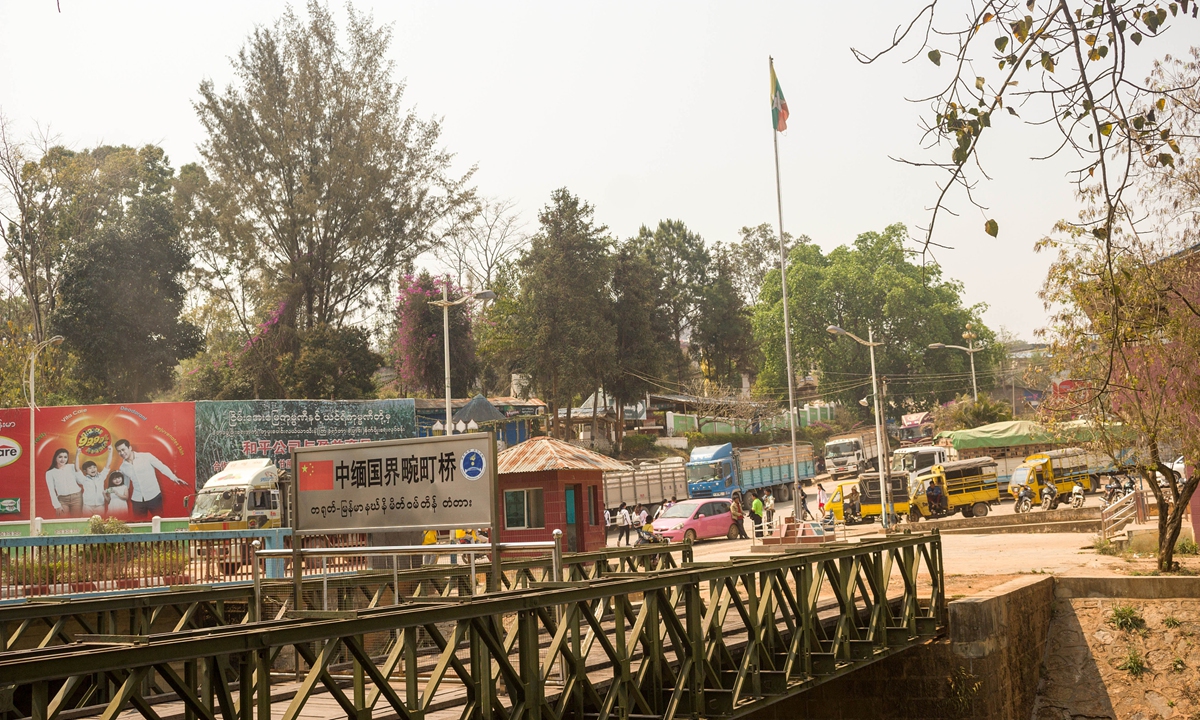
Photo: CFP
Live-fire drills and training exercises conducted by the Chinese military force along the Chinese side of the China-Myanmar border are defensive and aimed at safeguarding Chinese sovereignty, stability of border area and safety of personnel from impacts caused by the civil war in Myanmar, rather than an act to intervene in the internal affairs of the neighboring country, experts said on Sunday.
The Chinese People's Liberation Army (PLA) Southern Theater Command announced on Saturday that it will conduct a series of real combat training and drills along the Chinese side of the China-Myanmar border, which is aimed to test the rapid maneuverability, border sealing and firepower capabilities of the military units of the theater command.
In accordance with the annual training plan, the PLA Southern Theater Command organized its army units to conduct "live-fire drills starting from Saturday along the Chinese side of the China-Myanmar border," according to Senior Colonel Tian Junli, a spokesperson of the PLA Southern Theater Command.
"The theater command forces are always prepared to respond to various emergencies and are resolute in safeguarding national sovereignty, border stability and the safety of the people's lives and property," Tian said in a statement released by the official account of the PLA Southern Theater Command.
The PLA Daily on Sunday published a commentary which said that "Recently, due to many reasons, military conflicts have broken out in multiple regions of north Myanmar, causing casualties and severe security situation."
Since the latest outbreak of armed conflict in Myanmar, apart from calling for peace and a cease-fire, China is making great efforts to work with Myanmar to place and help evacuees, and also to help nationals from the third party to evacuate from Myanmar through China, according to the Chinese Foreign Ministry.
The PLA Daily said the recent live-fire drills and training exercises will further strengthen the awareness of crisis and sense of duty among the officers and troops, and will comprehensively test and improve the military's capability of managing and controlling the border region.
Non-interference principleAfter the fighting in Myanmar intensified in recent days, the Chinese Embassy in Myanmar on Friday urged Chinese nationals to evacuate the Laukkai area of the Kokang region in northern Myanmar immediately, and stay away from the zone, as conflicts continue in the area, according to media reports.
Song Zhongping, a Chinese military experts and TV commentator, told the Global Times on Saturday that "Myanmar is a country that has been suffering from a long-standing civil war… the periodic conflicts within the country are a persistent threat to China's border security, so taking into account the worsening situation within Myanmar, it's reasonable for the Chinese military to take necessary actions to deal with emergencies and the potential escalation of any conflict."
In March 2017, when military clashes in north Myanmar caused casualties, the PLA also staged an air-ground live-fire drill along the border region. According to the Xinhua News Agency, the joint drill at that time, carried out by the Southern Theater Command of the PLA was "according to an annual training schedule, [and] was aimed at testing the troops' capabilities in rapid maneuver, precise destruction, vertical blockade and joint strike."
Experts said that conducting military drills along the China-Myanmar border is an act to deal with the periodic instability in northern Myanmar. It is not the first time the PLA has taken similar action, which is aimed at self-defense and dealing with emergencies and potential escalation. It will strictly follow the principle of non-interference.
Zhu Zhenming, a professor at the Yunnan Academy of Social Sciences, told the Global Times on Sunday that the drills will reassure people on the Chinese side of the border, and it is also a message to the all conflicting parties in Myanmar that they should try their best to avoid damaging the border security, as well as the safety of Chinese communities near border regions.
"The fights between them are not our business, but China will not allow any shell or bullet to be fired across the border and harm Chinese people. We also oppose any force within Myanmar to use China to serve their interests to fight other parties," Zhu noted.
Some ethnic minority regional armed forces in Myanmar claimed that they are "countering telecom fraud" for China and are attempting to persuade others that China is supporting them in their fight against the Myanmar government. "This is absolutely not China's position, and we oppose anyone using China to serve their own interests," Zhu said.
Necessary measures For the conflicting parties in Myanmar, neither the government forces nor the local warlords want to see an incident that might harm the security of China and Chinese people, but if there are outbreaks of clash close to the border, bombs or shells could be fired across the border and cause damage on the Chinese side. A potential inflow of refugees represents another big challenge, experts said.
Wei Dongxu, a Beijing-based military expert, told the Global Times on Saturday that the training exercises like rapid maneuverability and border control or border sealing are flagging that PLA forces are able to be deployed at speed and are capable of effectively controlling the border in an emergency situation.
Song said that live-fire drills are mainly defensive, as it might test the capability of China's air defense to deter and defend against military aircraft, bombs and missiles that could potentially encroach on the border while armed conflict in Myanmar is ongoing. Some observers added that the live-fire drills might include artillery firing, which is an act to warn the warring parties in Myanmar to stay away from China's territory.




